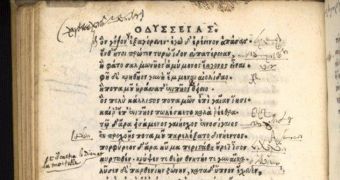Some days ago, the University of Chicago Library launched a contest to identify a mystery script found on the margins of several pages of Book 11 of Homer's “Odyssey.” They had offered $1,000 (€724) to anyone who could decipher the handwritten scribblings, and it seems that the mystery has already been solved.
The volume in which the mystery script was discovered is a copy of the rare 1504 edition of Homer's ancient Greek epic poem “The Odyssey,” donated to the University of Chicago in 2007 by a man called M.C. Lang.
When he purchased the book, the donor thought the handwritten annotations were some kind of 19th-century French shorthand, but he had no evidence to prove his hypothesis. So, he decided to offer a monetary prize to whoever managed to successfully decipher the unrecognizable notes.
“Mr. Lang wanted a conclusive identification with evidence and sample translations, which is why he generously offered the prize award,” Alice Schreyer, assistant university librarian at the University of Chicago Library, told NBC News.
“The prize was for the first person who identifies the script, provides evidence to support the conclusion, and executes a translation of selected portions of the mysterious marginalia,” she added.
The curator has now announced that a researcher managed to identify the script used for the strange annotations, adding that the results will be published soon. It is not known at this point if Lang's suspicions were correct.
The Book 11 of “The Odyssey” describes the Greek hero's journey to the underworld of Hades after the Trojan War, and was written by Homer in the 8th century B.C.

 14 DAY TRIAL //
14 DAY TRIAL //